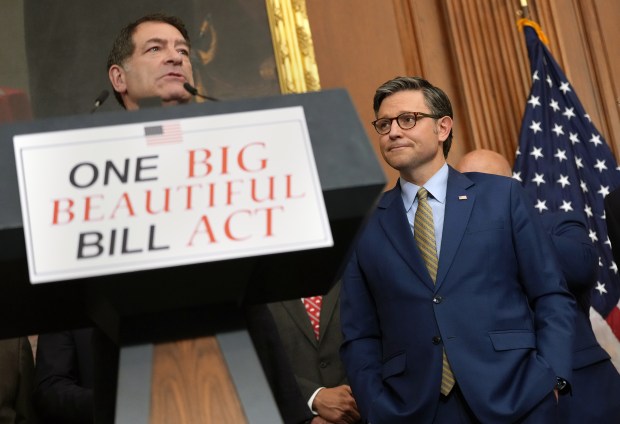In Chicago, we stand at a critical juncture. The Illinois Department of Transportation (IDOT) and Chicago Department of Transportation (CDOT) are proposing a rebuild of North DuSable Lake Shore Drive, a project that will shape our lakefront and city for generations. Unfortunately, the current plans fall woefully short of addressing the urgent climate and mobility challenges we face. As representatives of more than a dozen local organizations, we are calling for a halt to the current project to ensure it aligns with our climate goals and sustainable transportation needs.
Chicago has set ambitious climate goals, aiming to reduce carbon emissions by 62% by 2040 and to have 45% of all trips taken by walking, biking, transit or other noncar modes by the same year. The proposed DuSable Lake Shore Drive rebuild, unfortunately, does not significantly reduce transportation-related climate impacts or pollution. It largely maintains the status quo, missing a crucial opportunity to create a more sustainable and accessible future.
In a significant move earlier this summer, the Illinois General Assembly passed resolutions calling on state and city transportation officials to radically rethink the project. Lawmakers urged planners to “transform DuSable Lake Shore Drive into a true boulevard” and “emphasize green urban mobility.” The pushback intensified in June when four aldermen representing lakefront wards took the extraordinary step of demanding a halt to the project in the Tribune; they expressed deep concerns about “the trajectory of the project as an urban highway without significant mass transit elements.” This unified stance from both state and local elected officials underscores the growing consensus that the current DuSable Lake Shore Drive redesign falls short of the transformative vision needed for Chicago’s future.
IDOT’s own survey data reveals a striking fact: 60% of North DuSable Lake Shore Drive drivers would switch to taking the bus if it were more reliable and frequent. This compelling statistic highlights a tremendous opportunity for a seismic shift toward sustainable transportation. Yet, the current proposal inexplicably neglects to incorporate dedicated lanes for transit along the entire corridor. This omission is not just a missed opportunity; it fundamentally undermines our urgent climate action goals and fails to capitalize on the clear demand for better transit options.
The current plan does not consider the impact of new and planned lakefront developments or the needs of people poorly served by the existing transportation and park system, including individuals with disabilities, older adults and young people.
Residents and numerous elected leaders have called for a comprehensive vision that prioritizes sustainable transportation. Ignoring this input not only undermines public trust but also misses an opportunity to create a project that truly serves the community.
We’re urging leaders to take decisive action to ensure the North DuSable Lake Shore Drive project supports our climate and sustainable transportation goals.
IDOT should not present a preferred alternative at the planned Aug. 8 public meeting. The Illinois General Assembly and more than a dozen Chicago City Council members have already expressed opposition to the current trajectory of the project.
The planning process should be restarted with a broader vision for the entire lakefront, led by an entity such as Chicago’s Department of Planning and Development. This new approach should fully develop the community’s long-term vision for the lakefront before proceeding with planning and engineering.
The project should explicitly support city and regional goals to reduce carbon emissions and double transit ridership. This includes integrating dedicated space on the roadway for transit, such as bus-only lanes, bus rapid transit or light rail transit. Given the project’s scale, a clear timeline for a reinvigorated planning process is essential to avoid another decade of engagement and discussion.
The stakes could not be higher. Chicago’s Climate Action Plan is not just a set of goals; it is a comprehensive strategy to create resilient and sustainable communities across the city. It includes initiatives to reduce pollution, improve air quality and ensure a transition to renewable energy. The North DuSable Lake Shore Drive project must align with these initiatives to ensure we are not undermining our climate action efforts.
Moreover, the benefits of a sustainable and accessible lakefront extend beyond environmental impact. Improved mobility options can ease congestion, enhance quality of life and provide equitable access to transportation for all residents.
The time for visionary leadership is now. We have a once-in-a-generation opportunity to reimagine North DuSable Lake Shore Drive in a way that supports our climate and sustainable transportation goals. The current proposal falls short, but it is not too late to change course. By pausing the current planning process, restarting with a broader vision and committing to a plan that emphasizes sustainable transportation, we can create a lakefront that meets the needs of all Chicagoans and sets a new standard for urban infrastructure projects.
Chris Conley is interim president and CEO of the Metropolitan Planning Council. Jacky Grimshaw is senior director of transportation and policy for the Center for Neighborhood Technology. Kyle Lucas is co-founder of Better Streets Chicago. Amy Rynell is executive director of the Active Transportation Alliance.
Submit a letter, of no more than 400 words, to the editor here or email letters@chicagotribune.com.




